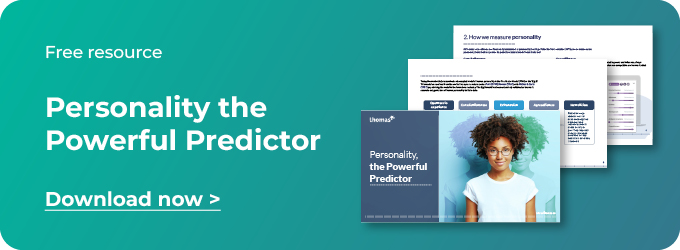You will have heard of someone having a “Type A personality” but what about the other types? Yes, there are three more, B, C, D. Well, today in this guide you are going to learn more about Type C personalities.
In brief, the Type C personality is the detailed one. They thrive in environments where things are controlled and stable. Understanding this type of personality along with the other three is going to be key in getting a better understanding of your workforce and how it can affect recruitment decisions.
We are going to take a look at this personality type and understand in more detail what it means to have a Type C personality. In this guide, we will get a better understanding of the impact of this behavior and why understanding this personality type is important in the recruitment process. Finally we will discuss how the Thomas range of tools can help you find out what personality type your candidate has.
What is the Type C personality type?
The Type C personality can be better described as someone who thrives on being accurate, rational and applying logic to everything they do. Demanding logic over emotion is a natural dominant feature. They do not suffer from hype or drama, in fact, they dislike it because they want facts and data.
It is easy to get carried away with the idea that Type C individuals are lacking in emotion or show empathetic tendencies. Whilst they rarely get emotional over work, it is due to the nature of the personality type that drives them to promote logic, data and science beyond all other things.
Defined as detail orientated, logical and prepared, this careful, resourceful and thinking personality is very good in a situation where everything needs to be analyzed before any stands are taken.
However, this is one of the more passive personality traits, preferring cooperation over conflict. It can be hard to get the person to open up and they need to have trust in the relationships they have built before they do, leading to a lot of built up tension when decisions are based on anything but the facts laid out.
In a working environment, they are meticulous with the information and the data that they have to hand. You will commonly see Type C personalities in roles within science, medicine and law.

What it means to have a Type C personality
We now have an understanding of what a Type C personality is and how they can behave within the workplace but what are the main characteristics that make a Type C Personality stand out? Here are just some of the more commonly associated traits.
Consistent
Having a consistent workload, performance, results based center for their work is essential. Fundamentally, this is the approach they take to solving problems and working with others.
Controlled
Having a controlled response to anything that is put before them is again, essential. There are no dramatics or emotional swings.
Calm
Remaining calm to establish all the facts is again, essential to how they behave. They will have the data before making decisions.
Cooperative
They love to play along with others, and use their time to develop answers and research and be meticulous with information rather than a scattergun approach to working with others.
Creative
You wouldn’t think that logic based people could be creative but, it is in the data that they see value and find creative ways to either exploit the information or create new solutions to an existing problem.
Conflict-resistant
Type C personalities are very conflict-resistant, preferring to get along with people even if it goes against their natural will to express opinions they believe in.
Perfectionist tendencies
With a meticulous approach to their work, the Type C personality will dedicate a lot of time, even personal time, to ensure that what they deliver is to the best of their abilities.
Difficulty adjusting to unwanted change
Because Type C personalities enjoy consistency in their lives, unwanted changes can cause internal turmoil and disruption.
An interest in small details
The need to be right based on the data at hand can lead Type C personalities searching through all sorts of information and details, even the smallest details to ensure that they are covering everything in their analysis.
Sensitivity toward the needs of others
Wanting to make sure others are happy is again, a very strong Type C trait. Putting others first is very common amongst Type C personalities.
Outward passiveness
Because they are concerned with others, putting other people out there first, it can lead to these characters being very passive towards others, almost getting derailed by them.
Pessimism
Fixating on things that might not even happen is also very common. It means that the Type C personality can fixate on it to make sure that they can control the outcome.
A tendency to deny or avoid extreme emotions
If they can’t control what is going to happen, they can become very self-involved and shut down from external pressure and stress, leading to more stress and anxiety.
How Type C personalities can impact behavior in the workplace
Any of the four personality types will impact behavior in the workplace. Understanding the Type C personality will better equip you with the positive or negative impact that can occur. You want to be able to understand the person that has Type C personality and best manage the triggers and even the types of work that each individual does.
Do you work with standard procedures? Do you have the kind of work that requires individuals to pull their own weight but see it through to completion? Then the Type C candidate is perfect for this role. They can manage workloads by themselves and because the nature of the work doesn’t require them to be at the behest of others, they can feel comfortable working alone to complete the task at hand.
However, should it be that the task starts to spiral out of control due to others not working in line with the created rules and regulations, Type C personalities can start to retract from their work and feel overwhelmed, causing them to create a pessimistic view of the work they are doing and of the company.
If your workplace is also subject to a lot of change, this can be uncomfortable for C Type personalities as well. They require reassurance that their work is to the standard that is being set and that any changes are regardless of their input. However, whilst change can be a bad thing, bringing C Type personalities into the discussions from the beginning and tasking them with how to create a structure and new methods and procedures would be of strategic advantage.

How to get the best of out candidates and employees with Type C personality
Understanding you have a Type C personality in your candidates or current employees is a good start. What you do to best manage these characteristics is going to be the key to success. As with all personality types, there will be positive and negative aspects so how you manage and how you understand how to manage is critical.
Going solo or playing with others
This is one of the few personality types that can handle both situations but, you need to be aware that Type C personalities can be sensitive to criticism or not appreciate lack of evidence when making decisions. Teams need to manage the process of decision making with a clear structure to make this personality style thrive. When working alone, setting clear guidelines is also important as this gives them the criteria to complete their work.
Making informed decisions
Because of their nature, Type C personalities like to make informed decisions based on the data they have gathered. Allowing them to make decisions comes with an understanding that this process can take more time. However, once the decision is made, be ready to have all the facts to hand before debating any decision.
Why understanding the Type C personality type is important in hiring decisions
Whether you’re at the interview stage or you’re considering promotions/lateral moves within the business, knowing that you have a Type C personality is going to be of strategic value. From understanding a candidate’s suitability for a role, to seeing how they would behave with others in the organization before even having the job is of course of great value.
Type C personalities are detail orientated, data driven and surround themselves in facts and logic over emotional qualities. Understanding even these basic principles will make you understand that low stress environments are better suited to this type of personality and that collaboration is ok up to a point. Preferring to work individually but supporting others is a key aspect of the Type C personality.
Other key aspects to consider about Type C personalities is that due to their reserved nature and lack of assertiveness to avoid conflict, they can begin to close down around their co-workers and start missing deadlines or not completing their tasks. Knowing how to manage these personalities to be able to open up and speak to their line managers or colleagues when issues arise is going to be critically important.
In summary
The type C personality can be better described as someone who thrives on being accurate, rational and applying logic to everything they do. They can however also struggle to emote their feelings and hold a lot in when things go awry, preferring to to be less assertive and be more cooperative in nature. When managing this personality type it is important to understand that stronger characters can easily influence Type C personalities without much consideration for their well being.
Thomas’ workplace personality test can be used to help assess and understand a candidates or employee's personality type and wider personality.
Based on the globally recognized and respected 'Big 5' psychological theory, the High Potential Trait Indicator (or HPTI) as we also call it, assesses six core traits (Conscientiousness, Adjustment, Curiosity, Risk Approach, Ambiguity Acceptance and Competitiveness) to help you identify the best candidate for a role and identify leadership potential, adding confidence to your recruitment.
If you would like to learn more about our assessments, please speak to one of our team.





